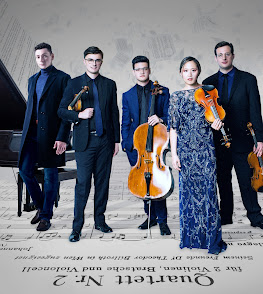Chamber music to open Palladium's 2022: Collegial breadth in a freshly conceived program
The striking layout of the program offered by the Balourdet Quartet and pianist Dominic Cheli for their
 |
| Dominic Cheli and Balourdet Quartet |
concert January 20 had a clarifying, timely theme behind it.
As announced by Cheli from the Carmel Palladium stage, what unified the center's Classical Series event was the working title of "Compassion and Inspiration." With the pandemic as everybody's backdrop, those words have taken on special resonance. When the Balourdet Quartet came on after the pianist's solo segment, violinist Justin DeFilippis added another magnetic note: Friendship.
It's in the nature of most composers, even the most distinguished ones, to ground themselves in the music that came before them. Sometimes the linkage is personal. But even when it takes place at a distance, the abstract nature of music allows for feelings and forms to vibrate in new music to earlier emanations of the universal muse.
Johannes Brahms, though a lifelong bachelor, had significant personal relationships, no more so than with Robert and Clara Schumann. He was also a great venerator of older music, especially from the Baroque era. The fountainhead of this interest was J.S. Bach, but he also drew inspiration from Bach's French contemporaries, notably Francois Couperin. Furthermore, Brahms was influential, despite the conservative associations he had in the late 19th-century mind, from his heyday onward: Modernist archetype Arnold Schoenberg wrote a famous essay called "Brahms the Progressive." Thus, putting a personal stamp on the legacy one inherits was Brahms' stock in trade.
Cheli, besides delivering cogent oral program notes before each solo piece, showed his stylistic breadth in works of three composers: Erwin Schulhoff, Clara Schumann, and Francois Couperin. In his solo recital for last year's American Pianists Association competition in which he was a finalist, the pianist gave ample evidence of his wide range of repertoire interests and his distinctive flair for bringing out colors and rhythms.
Bringing forward the magpie evidence of influences Schulhoff felt in his turbulent life, cut off by the Holocaust in 1942, Cheli showed a feeling for color and the distinctiveness with which one hand can apply it in different registers. The vehicle was two contrasting movements from Schulhoff's Suite for the Left Hand, written for a friend, a pianist who had lost the use of his right hand in World War I, in which both men served. The influence of Claude Debussy, with whom Schulhoff studied briefly, was evident in "Preludio," and the pianist's rhythmic acuity was exhibited with drive in "Zingara," an exhibition of the Hungarian (or gypsy) influence in classical music of the late 19th and early 20th centuries.
A closer friendship shed influence on Clara Schumann's "Romanze" in A minor, op. 21, no. 1. The melting sort of melody evident in much of her husband's music received tender play in this piece. A further contrast of texture and emotional focus concluded Cheli's appealing mini-recital: Couperin's "Le Tic-Toc-Choc," a delightful evocation of clock rhythms originally designed to blend and contrast a harpsichord's two manual keyboards. A fleet-fingered pianist can make the piece work just fine on one keyboard, as Cheli did.
To fill out the concert's focus on Brahms, the Balourdet took the stage for the String Quartet in A minor, op. 51, no. 2. The first movement had an attractively light-textured feeling. The four players evinced plenty of flexibility, fortunately at the same time. The agitated section of the slow movement sounded especially bracing. The unusual, looking-both-ways third movement — "Quasi minuetto, moderato" — didn't jell at first; the textures got firmer as the movement proceeded and the music sounded less underpowered. At any rate, the bold onset of the finale made for a nice contrast. Apart from a few slips of intonation by first violinist Angela Bae, the performance was shipshape, with especially good drive imparted to the coda.
After intermission came a work of near-genius from an American composer who is gradually getting more appreciation. I remember when the custom was to refer to Amy Beach as "Mrs. H.H.A. Beach," which was how her music came into the world in the late 19th century, linked to her husband. It's been one of the minor triumphs of feminism that the energetic composer from Boston (the hometown of the Balourdet, by the way) is consistently known now as Amy Beach.
The effect of Brahms on her music is vivid in the Piano Quintet, p. 67, for which the two violinists switched places. With their colleagues Benjamin Zannoni, viola, and Russell Houston, cello, they displayed full partnership with Cheli.
The mellifluous quality of the first movement's second theme was close to magical; a fine dramatic grasp of the main material stayed unanimous. Despite the evident debt to what Brahms represented to her generation, Beach was receptive to newer tendencies in music of her time, such as Debussy's. There were diaphanous tremolos joined to classical ways of building tension.
In the second movement, a glorious cello melody introduces a soaring ensemble climax. In the finale, anticipation is intense before a grand pause invites everyone to take a breath, setting up recollection of the work's opening and leading to a confident coda. The five players made the most of this progression. The case for many more opportunities to hear the music of Amy Beach was stoutly put forth. And imaginative programming, well-executed, will always carry the day.



Comments
Post a Comment